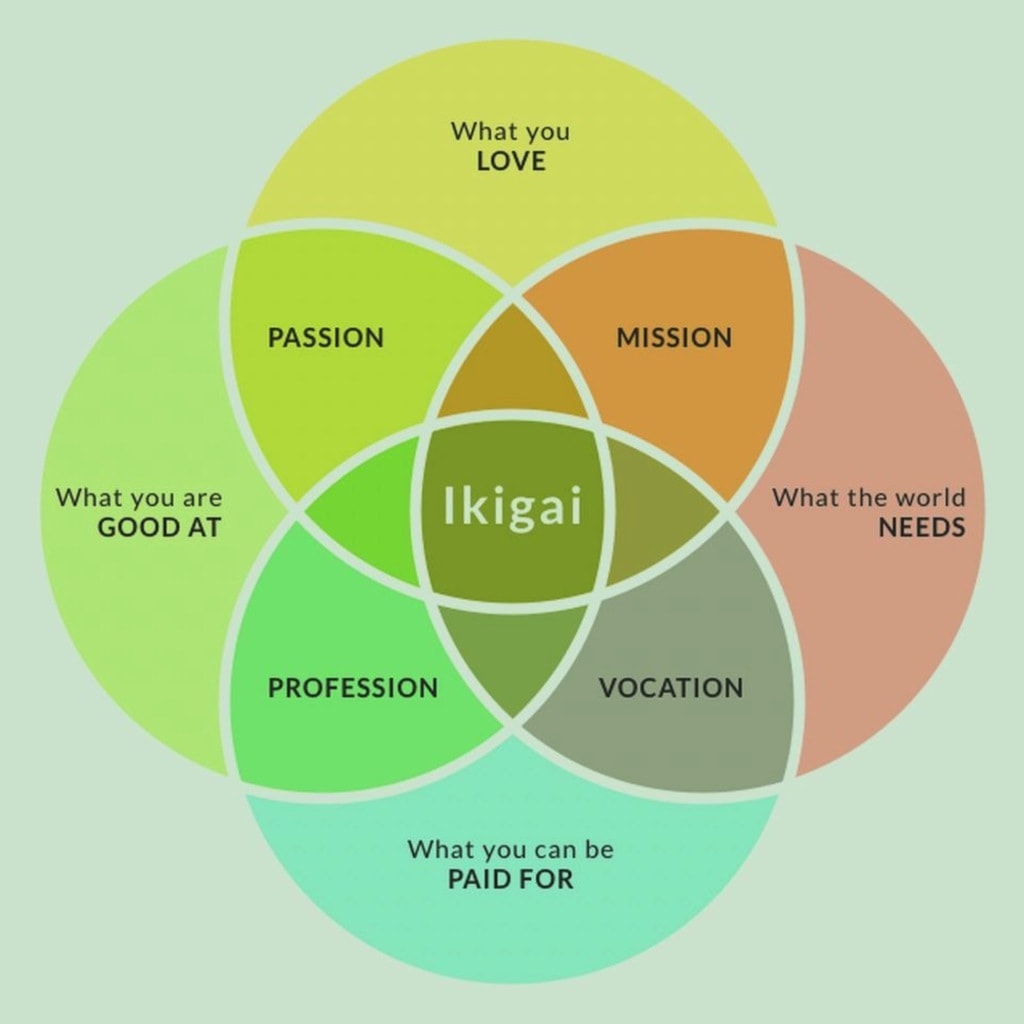Ikigai is a Japanese holistic concept that refers to the essence of life for each individual. The word ikigai is a portmanteau of two other Japanese words: ikiru and kai. Respectively, the words refer to the state of living and the fruits of action. Combined, these words represent the notion of fulfillment in life through passion and purpose.
However, the concept means different things to different adherents. What unifies its followers is the belief that each person should find his or her own sense of life fulfillment and inner resolve. As such, no prearranged set of values or priorities can be forced upon you to give you a sense of ikigai.
The meaning of ikigai
For some adherents, ikigai is embodied through physical activity and wellness. For others, it’s achieved through hard work and success. Others might find it via entertainment and leisure. According to the ikigai Venn diagram, the values in living are grouped into four overlapping circles:
The values of love and talent (top and left) are both areas that you can control as an individual. Combined, they create passion. Meanwhile, love combined with the ability to help others gives you a mission.
The values of profitability and popular need (bottom, right) are largely in the hands of society as a whole. The two dichotomous values for most people are love and money, which appear at opposite ends of the diagram.
Based on this diagram, most Americans would assume that you must embody all four values in equal proportion to achieve ikigai. However, this interpretation has not been shared by the millions of people who’ve followed the concept for decades.

Ikigai in Japan
In Japan, ikigai is about having something to live for, regardless of whether it earns you money or makes you popular. The nation currently has the world’s highest life expectancy, a phenomenon that some observers credit in part to the multigenerational embrace of ikigai among the Japanese.
According to National Geographic Fellow and explorer/author Dan Buettner, the two most vulnerable years in a person’s life are their first, due to infant mortality, and the year that people retire. Among most followers of ikigai, there is no age for retirement because you never want to stop doing the things that bring you fulfillment in life.
Americans have long been reared on the notion that money brings fulfillment in life. According to ikigai, money only brings fulfillment if you can earn it through a profession that makes good use of your natural skills. Most importantly, you must find enjoyment in the activity.
Finding your own ikigai
To find your own ikigai, take some time to soul search for your personal concept of self-fulfillment. In the beginning, you might have hobbies that bring you great joy and satisfaction, yet know of no way to connect them to the outside world. Consequently, you might be stuck in a job that you don’t enjoy. Alternatively, you might be highly successful in your career, yet it leaves you no time for leisure or intimacy.
In the former case, one solution would be to look for possible ways to profit from your passions in some capacity, such as starting a topical YouTube channel or blog. If you cannot come up with any ideas, consider a third option. If you hate your clerical job but see no market for your current hobby, think of a possible new career that you might enjoy, such as animal care, and explore possible inroads to that field.

If cash is abundant yet your workaholic tendencies have left you with no personal life, make a list of the other things you’d like to explore in life beyond work. Take stock of which roles you’d need to relinquish in your career to have the time for other things. Reevaluate your cost of living and consider changing to an equally satisfying job with fewer hours, even if it means lower pay.
Ikigai is about balancing passions and strengths with necessities for utmost fulfillment during each phase of life. If time takes its toll on your strength, mobility or opportunities on one front, you can always adapt to find an ikigai that suits the next phase or your journey.









